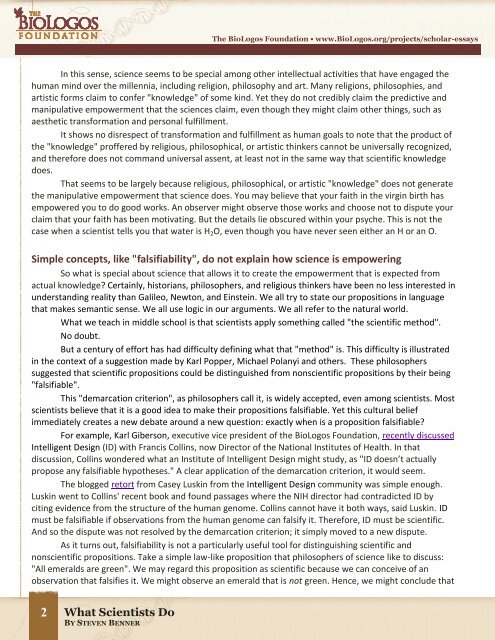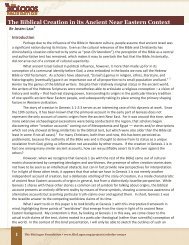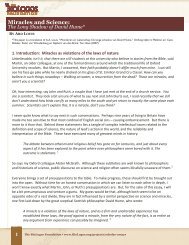What Scientists Do In this scholarly essay, Steve Benner - BioLogos
What Scientists Do In this scholarly essay, Steve Benner - BioLogos
What Scientists Do In this scholarly essay, Steve Benner - BioLogos
Create successful ePaper yourself
Turn your PDF publications into a flip-book with our unique Google optimized e-Paper software.
The <strong>BioLogos</strong> Foundation • www.<strong>BioLogos</strong>.org/projects/scholar-<strong>essay</strong>s<br />
<strong>In</strong> <strong>this</strong> sense, science seems to be special among other intellectual activities that have engaged the<br />
human mind over the millennia, including religion, philosophy and art. Many religions, philosophies, and<br />
artistic forms claim to confer "knowledge" of some kind. Yet they do not credibly claim the predictive and<br />
manipulative empowerment that the sciences claim, even though they might claim other things, such as<br />
aesthetic transformation and personal fulfillment.<br />
It shows no disrespect of transformation and fulfillment as human goals to note that the product of<br />
the "knowledge" proffered by religious, philosophical, or artistic thinkers cannot be universally recognized,<br />
and therefore does not command universal assent, at least not in the same way that scientific knowledge<br />
does.<br />
That seems to be largely because religious, philosophical, or artistic "knowledge" does not generate<br />
the manipulative empowerment that science does. You may believe that your faith in the virgin birth has<br />
empowered you to do good works. An observer might observe those works and choose not to dispute your<br />
claim that your faith has been motivating. But the details lie obscured within your psyche. This is not the<br />
case when a scientist tells you that water is H 2 O, even though you have never seen either an H or an O.<br />
Simple concepts, like "falsifiability", do not explain how science is empowering<br />
So what is special about science that allows it to create the empowerment that is expected from<br />
actual knowledge Certainly, historians, philosophers, and religious thinkers have been no less interested in<br />
understanding reality than Galileo, Newton, and Einstein. We all try to state our propositions in language<br />
that makes semantic sense. We all use logic in our arguments. We all refer to the natural world.<br />
<strong>What</strong> we teach in middle school is that scientists apply something called "the scientific method".<br />
No doubt.<br />
But a century of effort has had difficulty defining what that "method" is. This difficulty is illustrated<br />
in the context of a suggestion made by Karl Popper, Michael Polanyi and others. These philosophers<br />
suggested that scientific propositions could be distinguished from nonscientific propositions by their being<br />
"falsifiable".<br />
This "demarcation criterion", as philosophers call it, is widely accepted, even among scientists. Most<br />
scientists believe that it is a good idea to make their propositions falsifiable. Yet <strong>this</strong> cultural belief<br />
immediately creates a new debate around a new question: exactly when is a proposition falsifiable<br />
For example, Karl Giberson, executive vice president of the <strong>BioLogos</strong> Foundation, recently discussed<br />
<strong>In</strong>telligent Design (ID) with Francis Collins, now Director of the National <strong>In</strong>stitutes of Health. <strong>In</strong> that<br />
discussion, Collins wondered what an <strong>In</strong>stitute of <strong>In</strong>telligent Design might study, as "ID doesn’t actually<br />
propose any falsifiable hypotheses." A clear application of the demarcation criterion, it would seem.<br />
The blogged retort from Casey Luskin from the <strong>In</strong>telligent Design community was simple enough.<br />
Luskin went to Collins' recent book and found passages where the NIH director had contradicted ID by<br />
citing evidence from the structure of the human genome. Collins cannot have it both ways, said Luskin. ID<br />
must be falsifiable if observations from the human genome can falsify it. Therefore, ID must be scientific.<br />
And so the dispute was not resolved by the demarcation criterion; it simply moved to a new dispute.<br />
As it turns out, falsifiability is not a particularly useful tool for distinguishing scientific and<br />
nonscientific propositions. Take a simple law-like proposition that philosophers of science like to discuss:<br />
"All emeralds are green". We may regard <strong>this</strong> proposition as scientific because we can conceive of an<br />
observation that falsifies it. We might observe an emerald that is not green. Hence, we might conclude that<br />
2<br />
<strong>What</strong> <strong>Scientists</strong> <strong>Do</strong><br />
BY STEVEN BENNER




